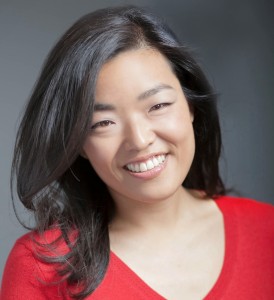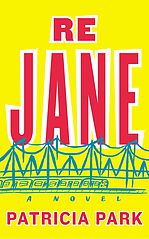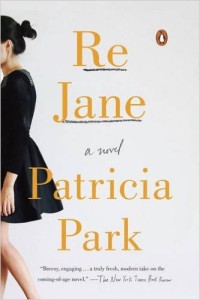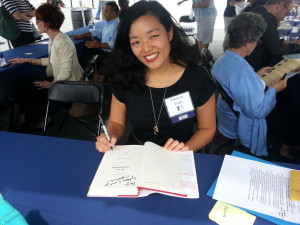
 I read Re Jane while I was in the midst of renovating a home while living over an hour away. I didn’t have much time for joy reading and my ability to concentrate was marginal. However, I couldn’t let go of this book. No matter how long it had been between picking it up, it was as though I hadn’t been away at all. The characters, the scenes, stuck to me like a hearty meal. Patricia Park’s writing is exquisite and unpredictable. Re Jane has been marketed as a fresh take on Jane Eyre and plenty has already been written about that. I’d prefer to ask Ms. Park about other aspects that piqued my curiosity.
I read Re Jane while I was in the midst of renovating a home while living over an hour away. I didn’t have much time for joy reading and my ability to concentrate was marginal. However, I couldn’t let go of this book. No matter how long it had been between picking it up, it was as though I hadn’t been away at all. The characters, the scenes, stuck to me like a hearty meal. Patricia Park’s writing is exquisite and unpredictable. Re Jane has been marketed as a fresh take on Jane Eyre and plenty has already been written about that. I’d prefer to ask Ms. Park about other aspects that piqued my curiosity.
Many passages in your book amazed me, either from their jealousy-inspiring eloquence and inventiveness, or my ignorance. For example when Jane and her aunt Emo talk about natural double-folded eyes versus the kind that folds inward. I had a vague idea what they were talking about and Googled (I also had to look up if Don’t Throw Me Away and Leave Me was an actual TV show, that’s how real your book felt). I discovered adding an eyelid fold is the most popular plastic surgery among Asians and many believe it will further their career if done. TV star Julie Chen was told to do it, and did. How do you feel about the popularity of this surgery?
I grew up in a Korean community in New York City, where one of the main markers of beauty was whether you had double-folded eyelids or whether you did not. While my mother and siblings have natural double folds, I was in the latter camp. It was the genetic hand I was dealt, and I’d just have to live with it. When I traveled to Seoul to research this novel, I was struck by all the subway ads for plastic surgery. Blepharoplasty–the double eyelid surgery–is quite common; girls like me, who’d left their eyelids well alone, were a rarity (and not in a good way). South Korea is an extremely competitive society, one where you’re expected to include your photo—and sometimes your measurements—along with your resume for job interviews. There’s so much pressure to look and perform your best.
Please define nunchi and tap-tap-hae, terms that come up often in Re Jane.
You know how we have foreign expressions—schadenfreude or zeitgeist spring readily to mind—that just sum up a whole feeling but require at least a paragraph to translate? Nunchi is this unspoken ability to read a situation and anticipate how you’re expected to behave. Eunice Oh, a computer techie from the book, likens nunchi to a Tolkien Eye of Sauron: “an all-knowing stink eye monitoring your every social misstep.” One example of nunchi is knowing to give up your seat for an elder or a pregnant lady, without being told to. It’s a code of behavior all Koreans are expected to know and live by.
Tap-tap-hae is loosely translated as “uncomfortable,” but it’s more than that—it’s sometimes a physical constriction, like when your bra strap’s too tight or it feels like the walls are closing in on you. Other times it’s a mental frustration—like when Jane has to explain how to operate a mouse—let alone a computer—to her technology-dumb aunt.
You worked on Re Jane for ten years. What were some of the biggest changes you made in the main characters and their story from the first draft?
Yup, about a decade, give or take. One of the main challenges was letting Jane break away from her Victorian prototype and namesake—Jane Eyre—and letting her move freely and take action, the way we expect of modern-day heroines.
When you began writing Re Jane, did you know where she was going to end up?
I knew I wanted to address—and rewrite—the iconic Brontean line: “Reader, I married him.” The “how” took years, with many, many wrong turns along the way.
It’s a challenge to make a heroine who is vulnerable and in need of growth but not weak. Jane often behaves in ways that she regrets yet I never lost faith in her. That takes talent! Any words of wisdom to writers struggling with a similar dilemma?
In early drafts, Jane was too smart and all-knowing for her own good; she had no room to grow. Then I overcorrected and made her too naïve. Hopefully by the published draft I came to a happy medium. I think the key is in the voice of the character, and letting the reader experience her thought process in her decisions—even if they are regrettable ones.
Manhattan without Korean grocery stores is unimaginable. I love the endless array of fresh flowers outside that turn each street corner into a fauvist painting; the convenience and coziness of them. Sometimes the people who work there are as caustic as Sang, the uncle in Re Jane. I’ve often wondered why they were that way, what were their lives like when they went home. Now I have a clearer idea thanks to your book. As someone whose parents own such a store, how did your family react to Sang and the way you portrayed the family business? Your book in general?
I’ve been floored by how positively people in my community have responded to the portrayal of Uncle Sang, his business, and the depiction of our community in general. Jane has been trained to think like a pragmatist—always trimming the fat and measuring the bottom line. I think a lot of children of immigrants—Korean or otherwise—can relate to these values taught to us by the first generation, and reconciling them with the values of “mainstream” America.
I also think everyone has an Uncle Sang in her life! He’s someone who was very much shaped and hardened by his environment and the times and circumstances of his life. But every now and again a sliver of warmth cracks through his, as you say, caustic surface.
Thank you for stopping by and answering my questions. I can’t wait to read more of your work! What are you working on now?
I’m working on my second novel, which follows the life of Juan Kim, a minor character from Re Jane. It takes place in Buenos Aires and New York City. I’ve got a few Bronte-related essays forthcoming, and just continuing with my nonfiction work in general.
Thank you so much!


 B A Ricucci says
B A Ricucci says
July 17, 2019 at 7:00 pmThank you for this book. It has helped me better understand an Asian immigrant mindset.
We have many Asian restaurant/take-out places where I live; I have frequented them for decades; however, I know few Asian-Americans myself, as I did not grow up with them in local schools or often have them as co-workers. Those I know seem to have almost a fear/respect way of relating to their elders, yet none choose to follow in their parents’ footsteps with regard to occupation (most of whom owned small businesses -the above restaurants or small groceries.) Hence, as the older people retire or die, these businesses tend to close up suddenly.
They invariably seemed SO hardworking (I have gone to funerals of several with whom I developed a rapport over the years, although it was strictly in terms of them keeping me fed!- I suspect they died young, before their time.)
I always wondered what their lives were like when they were not at work [although they always seemed to be working!] I sensed their lives were very difficult before they emigrated – in a life or death way.
Having read in Jackie Chan’s biography of the circumstances of his parents fleeing as refugees to Hong Kong (invasion of China by Japan), and learning at the time [1970’s] the horrors of the oftentimes precarious fate of Vietnamese who worked for the U.S. military, even if they managed to escape the fall of Saigon, I realized their circumstances were measurably different than the experiences of my immigrant ancestors (Italian).
It also helps me understand better the pragmatism of the younger generations, their tendency to gravitate towards financial and technology -related occupations (finding their own tangible security in the 21st century, as their parents did in their time?)
Sorry – I don’t usually ramble so – honest!
P.S. Thank you also for explaining tap-tap-hae – none of the free translation sites could help me with this, and that’s what originally led me to your site – I googled tap-tap-hae Korean! The definition is much as I surmised; it’s nice to know I was on the right track!
P.P.S. I truly miss my Korean dramas – used to get them on independent station out of Philadelphia…but then they disappeared. I appreciated the way the so-called soap operas’ storylines would actually resolve themselves after several years, unlike the American ones, which can meander on for decades w/no resolutions in sight! Unfortunately, the programming disappeared, with no explanation.
The historical drama series on Yi Soon Shin was an especial favorite of mine…I think I somewhat fell in love with the character over the course of the story LOL!!
 Jo Maeder says
Jo Maeder says
July 18, 2019 at 2:12 pmThank you! No such thing as too much rambling when it comes from the heart. – Jo